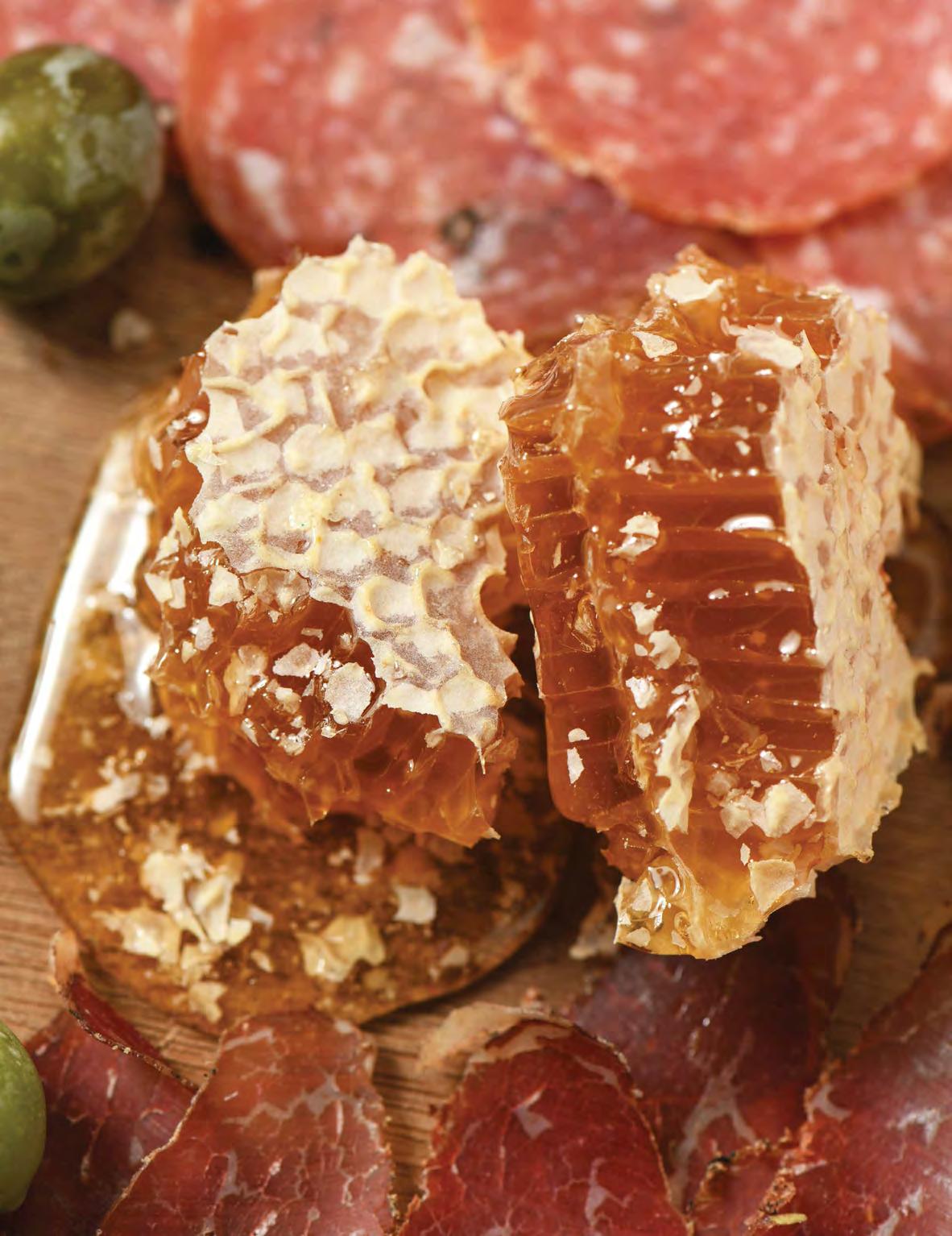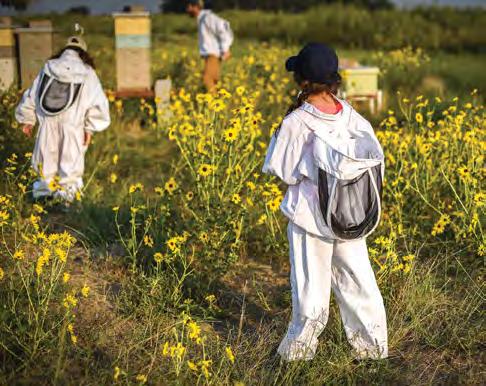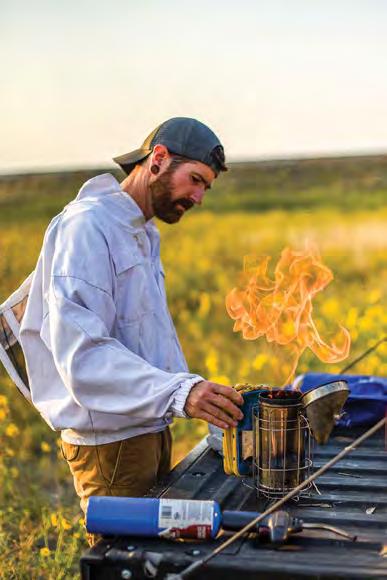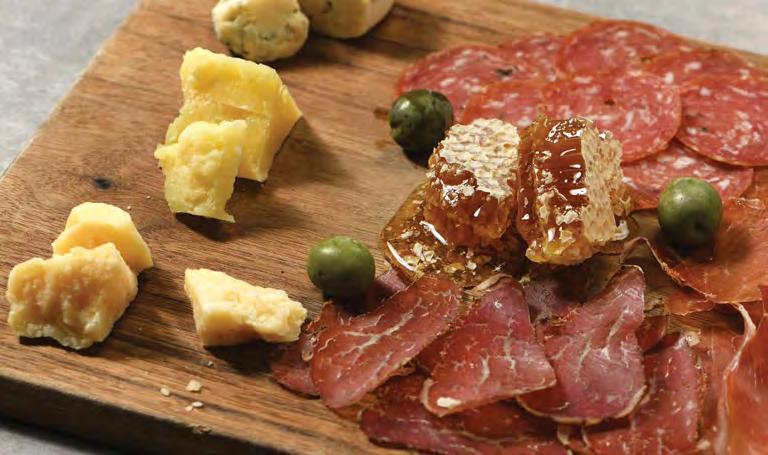
4 minute read
place
The Broadmoor’s proprietary honey underscores the culinary team’s commitment to sourcing sustainable, artisanal, and local ingredients. BY
CALLIE SUMLIN
Advertisement
Whether it’s accompanying imported meats and cheeses on your antipasto board at Ristorante del Lago, comprising the filling of a bonbon at Café Julie’s, or sweetening a Honey Maker Lemonade at the Golden Bee, The Broadmoor’s proprietary honey is a powerhouse local product and a prime example of the resort’s self-sustaining ecosystem of artisanal ingredients.
This honey, which is produced at The Broadmoor's owner's Eagles Nest Ranch in Northern Colorado, is used in drinks and dishes throughout the resort. Much like the Wagyu beef from Eagles Nest Ranch—home to the most genetically pure herd of Wagyu cattle in America—and the seasonal produce grown in The Broadmoor’s greenhouses, this sweet elixir highlights the tightly closed loop of relationships between the ranch, the resort’s onsite gardens, local purveyors, and small producers around the globe to source the highest-quality ingredients for the resort’s restaurants and culinary programs. For guests, that attention to quality and environmental stewardship results in unparalleled deliciousness and luxury.
The Broadmoor has worked with KennethJames (a.k.a “KC”) Tencza of Illuman Apiary for nearly eight years to produce the 1,500-some pounds of honey used annually at the resort. Tencza, who is also a pastor, originally began learning about beekeeping to spend more time with his daughter, Yara. What started as a hobby has turned into a calling and a thriving family business. “They’re a fantastic family,” says Broadmoor Vice President of Food and Beverage David Patterson. “KC is more in tune with the nature and science of bees and honey production than anyone I’ve ever spent time with.”
Eagles Nest Ranch, a 50,000-acre working cattle ranch, is a carefully managed and tightly interconnected ecosystem. In addition to
Tencza’s hives and the resort’s herd of Wagyu cattle, the ranch also comprises a diverse landscape of farmland, marshes, river bottom, and forest. All of the grains consumed by the cattle are grown on the ranch, which is also a wild game bird preserve, making it a truly biodiverse and dynamic part of Colorado’s natural landscape. Understanding and embracing that complex system is key to Tencza’s approach to beekeeping: “My goal is to have a honey that tastes like Eagles Nest and to represent that sense of place," he says.
“Beekeeping follows the seasons,” Tencza says of his craft. “In a day of beekeeping, I get to participate in something complex, magical, challenging, and rewarding. I am an athlete, waking up before the sun and lifting heavy boxes for hours on end. I am a biologist, approaching the hives with curiosity and respect. I am a chemist, thinking about reactions and treatments. I am an ecologist, embracing environments and weather patterns. I am a farmer, cultivating what I know. And I am a poet, seeing how all these things come together.”
Unlike many Colorado beekeepers who transport their hives to California to pollinate during winter, Tencza opts to keep his bees at Eagles Nest year-round. He says this supports a sustainable biology of hardier, healthier bees more adapted to Colorado’s ecosystem. Tencza’s unique appreciation for the environment, attention to detail, and respect for the pollinators “adds something to the honey,” Patterson says.

The honey blending process is also unique: Tencza hand-harvests the honey throughout the season (leaving plenty for the bees, of course), pulling some after successive blooms of the bees’ favorite flowers. He then blends these harvests to create a well-rounded product that reflects the land’s terroir. “It has parallels to winemaking,” Patterson says.

Eagles Nest Ranch wildflower honey is The Broadmoor’s signature blend and is used property-wide. “That is atypical when you talk about such a highquality ingredient,” Patterson says. “It’s integrated into numerous recipes and applications throughout.”
Honey production at Eagles Nest Ranch has grown year-over-year as Tencza has mastered the nuances of keeping the bees healthy and thriving. If yields are sufficient, guests may even see jars of The Broadmoor’s wildflower honey for sale at Café Julie’s.

Of course, honey is just one such unique and high-quality product used daily across The Broadmoor’s twenty restaurants, cafes, lounges, and bars; in the eighteen kitchens that service the resort’s event spaces; and at The Broadmoor’s three Wilderness Experience properties.
While the culinary operation at the resort is large-scale—encompassing a staff of more than 1,200 people—the team remains committed to sourcing exceptional ingredients from producers like Tencza.


“That’s such an important part of being a good chef,” Patterson says. “Forging those relationships with people who are harvesting, raising, and growing what we’re cooking.”
Take The Broadmoor’s olive oil, an exceptional-quality product from Castello di Ama, a small-production, 300 olive-tree family farm in Italy’s Tuscan hills. The resort purchases cases and cases of this peppery elixir for cooking regionally inspired Italian cuisine at Ristorante del Lago. The same product is also used for preparing food for banquets and in other restaurants.
The Broadmoor’s extraordinary Wagyu beef program at Eagles Nest Ranch is another standout. “The fact that we are raising our own herd and then handling the butchering and production to bring this exceptional Wagyu beef to our menus across campus is something we’re incredibly proud of,” Patterson says.
While Colorado has a short growing season, The Broadmoor’s horticultural and culinary teams take full advantage of the summer, tending the many gardens and hundreds of hanging baskets of vibrant blooms around campus, growing juicy tomatoes and fragrant herbs at the on-site greenhouses, and buying the state’s best products at peak freshness. “When asparagus is doing well at Milberger Farms in Pueblo, we’re buying as much of that as we can,” Patterson says. “And, of course, everything from the Western Slope—peaches, cherries, apricots, and as much Colorado Olathe corn as they can ship."
While the common perception of an organization as big as The Broadmoor is that it may not be able to focus on local, sustainable, seasonal, and regional food, the resort’s culinary team is, in fact, doing just that. Is it challenging to scale such high-quality ingredients to The Broadmoor’s quantity? Absolutely. But simple, high-quality ingredients are the key to delicious food, especially when they are produced and grown responsibly and in step with the seasons.
Sharing Our Abundance
The bounty of food produced at The Broadmoor is plentiful. While Broadmoor chefs are efficient in procuring and preparing only as much food as needed daily, there are inevitably leftovers. Rather than send excess food to landfills or the compost heap, The Broadmoor has partnered with Springs Rescue Mission, the largest shelter for people in need in the area, to provide a steady supply of donated food.
El Pomar Foundation and The Anschutz Foundation, both of which are associated with the resort, also donated $50,000 each to purchase a refrigerated truck the mission can use to safely transport prepared food from The Broadmoor and other organizations in the area. In 2022 alone, The Broadmoor donated more than 9,000 pounds of food to the Springs Rescue Mission.
Local Love
The Broadmoor is proud to feature local, sustainable, and seasonally inspired Colorado ingredients throughout our restaurants. Along with Broadmoor Farms, we work closely with local ranchers and farmers to shape the seasonality of our menus.











